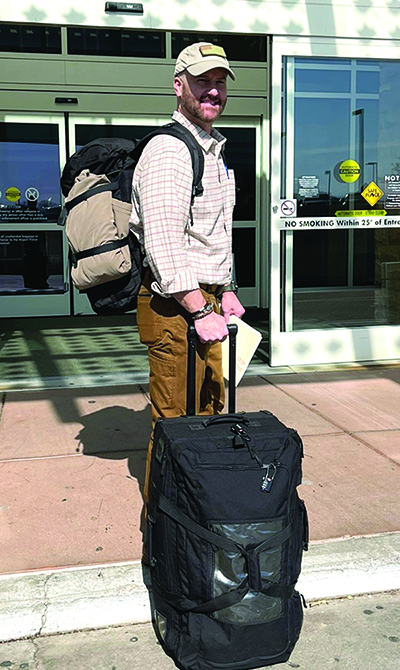Russ: rescue despite danger
In Ukraine with medical unit, H-Valley’s Frazier puts duty above safety in war zone

The anesthesiologist and Knox County Rescue Squad chief — who has called Hardin Valley home the last 25 years — joined other specialized Global Surgical Medical Support Group staff earlier this month to offer combat casualty care and training to Ukraine’s military and its civilians, even as Russian shells and bombs continue to ravage the country as the ongoing war is continuing.
Frazier was on a plane early Friday, March 4, and arrived not long after in Ukraine in an undisclosed location.
He has been giving regular text updates to his wife, Kim, along with their two teenage sons, Maddox and Jackson — although they can’t help but be increasingly concerned for his safety.
One of Frazier’s messages stated, “Our schedule is dictated by need and safety. We purposely don’t do the same thing every day. The one constant is the food, smiles, hugs and gratitude provided to us by the Ukrainians.
“In one town, an American flag patch was spotted on our clothing. An older gentleman approached us tearfully, hugged us, while simply saying, ‘Americans! Thank you!’ and walked away.
“East Tennesseans need to know that Ukraine may be 4,000 miles from home, but the land consists of proud citizens with a desire to be free. That is no different than Knoxville, Tennessee.
“Everyone’s prayers are deeply felt and appreciated.”
In yet another message, Russ shared his team had “taught over 400 people (Tactical Combat Casualty Care)” in just a few days time, while also treating patients.
“We held an extended class that included IV access and intubation/cricothyrotomies. We will be doing an advanced class for doctors with mass casualty procedures.
“The participants are from every walk of life.”
As the invasion has continued, a more recent communication noted, “We are staying packed up at all times now, in case of need to urgently evacuate, including taking armor and helmets everywhere;” while another stated, “Biggest ongoing issue is the logjam at the border. Millions of dollars in designated medical equipment is backed up at Poland-Ukraine border. Hundreds are in line to receive care.”
“Although it is incredibly scary to watch someone you love go headfirst into chaos, I understand, and so do these brave volunteers, that nothing compares to the fear and trauma of the people that they are setting out to help,” Kim said. “Our family has been so inspired by the hope and the honor shown by the Ukrainian people and their leaders.
“When you are called to use your gifts, you use them, despite the danger, and that’s what my husband and this team are doing,” she added.
While Frazier did not hesitate when contacted by GSMSG founder Dr. Aaron Epstein about the Ukraine mission, he did talk it over with his family first.
This is not the first time Frazier has responded to the call from GSMSG, as he has worked with the organization for several years, but his wife said it is the first time under dangerous war-raging circumstances.
“Every assignment has been different,” she said. “In Sweden they were imbedded with their military to provide emergency field care and surgical training. In Sierra Leone and Guyana, the team trained hospital and military base healthcare providers through hands-on surgical and medical care of civilians.”
Frazier is one of more than 1,000 licensed medical experts, along with U.S. Special operations veterans and other key volunteers from medical institutions around the world, who make up the non-profit non-government GSMSG, which is funded entirely through donations.
GSMSG background
In a press release, Epstein said he created the organization in 2015 “in response to the absence of conflict casualty care and training when the strength of ISIS peaked. This unique combination of medical expertise and the ability to operate in austere settings allows GSMSG to rapidly bring unparalleled services to some of the harshest environments and serve populations in dire need.”
Epstein was contacted by officials within the Ukrainian Ministry of Defense shortly after the country was invaded by Russian forces three weeks ago, requesting direct medical care and training for both their military and citizens.
“Translating the United States Military Combat Care Course and making it public was key to the coordination of this effort,” Epstein said. “The needs of the Ukrainian people and military are exactly why GSMSG exists, an immediate need for advanced medical care and training in austere environment regardless of government involvement.”
In addition to praying for the mission, those wishing to support GSMSG may visit https://www.gsmsg.org/ukrainiantccc.


